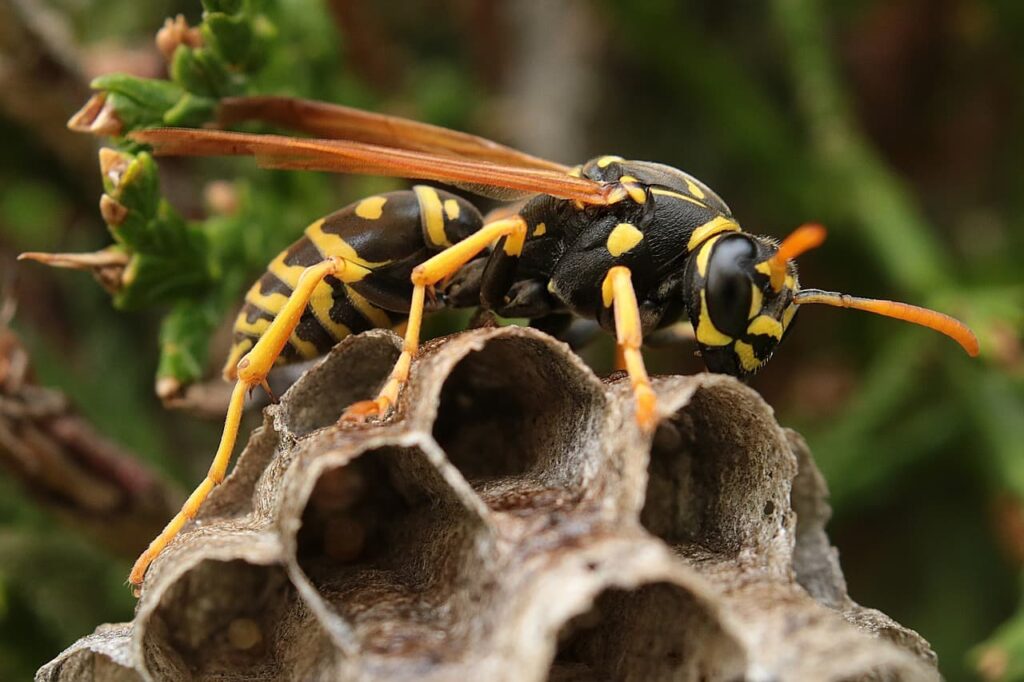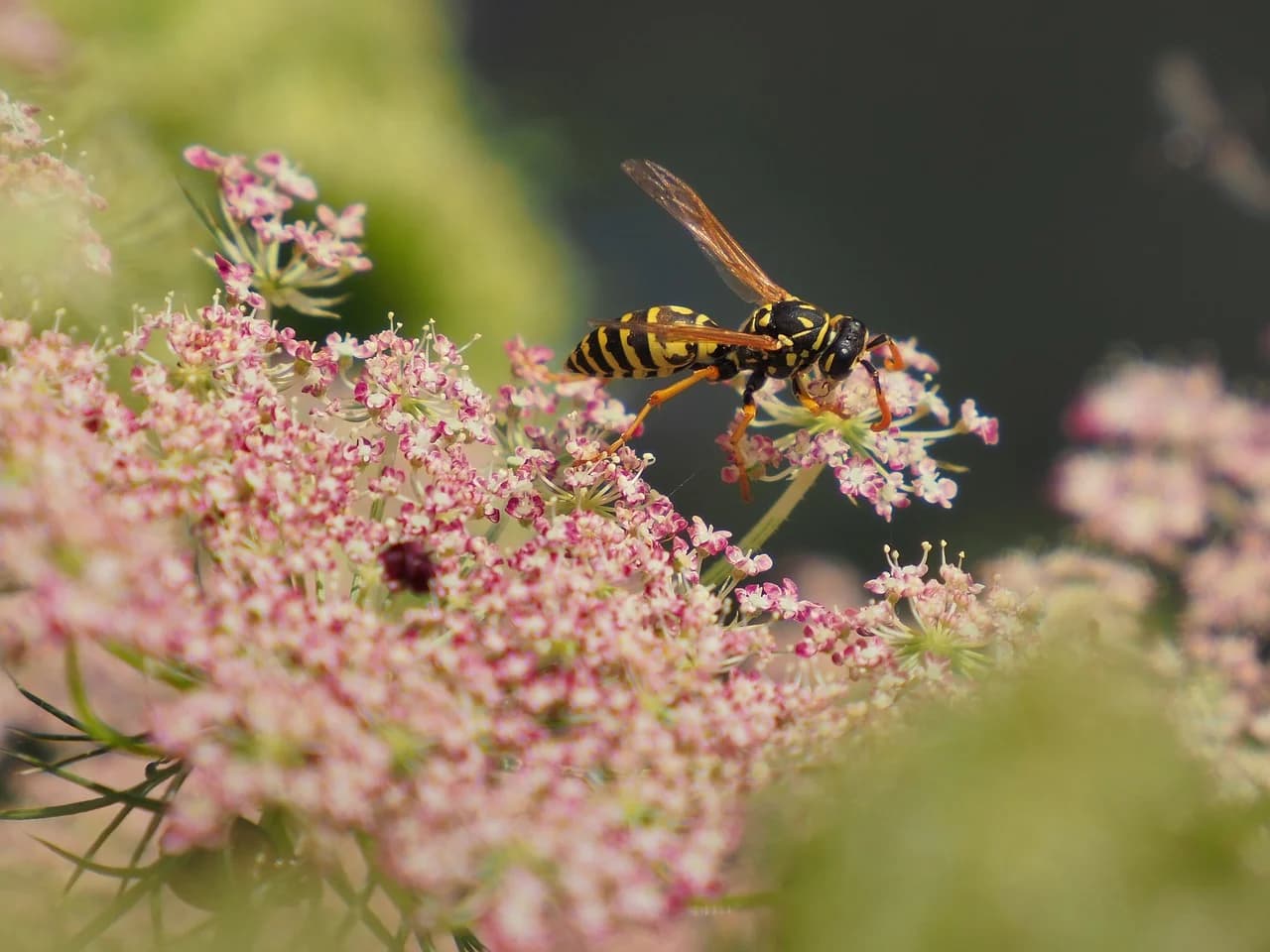When thinking of wasps, most people picture an annoying, stinging insect to avoid. However, these misunderstood creatures play a crucial role in ecosystems worldwide. Wasps are not only efficient predators that help control pest populations but also surprising contributors to pollination. Understanding their dual function can change the way we perceive these often-feared insects and highlight their ecological importance.
Wasps as Pest Controllers
Wasps are nature’s pest control agents, particularly parasitoid and predatory species. Their ability to hunt and regulate pest populations has a significant impact on agriculture, gardens, and natural ecosystems.
How Wasps Hunt and Kill Pests
Many wasps are predatory, feeding on insects such as caterpillars, aphids, and flies. Solitary wasps, like the mud dauber, paralyse their prey with venom before consuming or storing it as food for their larvae. Social wasps, such as yellowjackets, hunt in groups, often targeting large pest colonies.
Parasitoid wasps, a diverse group within the wasp family, take pest control to a new level. These wasps lay their eggs inside or on other insects, such as aphids or beetles. When the larvae hatch, they consume their host from within, effectively eliminating it. This process, while brutal, is a natural method of controlling pest populations.
The Agricultural Impact
Wasps are essential allies in agriculture. By preying on crop-destroying insects, they reduce the need for chemical pesticides, promoting more sustainable farming practices. Farmers are increasingly recognising their value, with some even introducing parasitoid wasps to manage pest outbreaks in greenhouses and fields.
The Role of Social Wasps
Social wasps, such as hornets and yellowjackets, are particularly effective at targeting large numbers of pests. These colonies work collectively, capturing and consuming insects to feed their larvae. This makes them especially valuable in controlling outbreaks of pests like caterpillars and grasshoppers, which can devastate crops.
Wasps as Pollinators
While bees take most of the credit for pollination, wasps also play a significant role. They visit flowers for nectar, inadvertently transferring pollen in the process. Although they are less hairy than bees—making them less efficient pollen carriers—their contribution to pollination should not be underestimated.
Key Pollinating Species
Certain wasps, like fig wasps, have evolved a symbiotic relationship with specific plants. Fig wasps are essential for the pollination of fig trees, ensuring their reproduction. Similarly, some orchid species depend on wasps to carry pollen between flowers, often mimicking the appearance of female wasps to attract males.
Benefits to Biodiversity
Wasps’ role as pollinators supports biodiversity by aiding the reproduction of plants, which in turn provide food and habitat for other species. In ecosystems where bees are declining due to habitat loss and pesticide use, wasps can serve as a valuable backup pollination system.
Overlooked Contributions
In addition to figs and orchids, many other plants benefit from wasp pollination. Wildflowers, garden plants, and even certain crops receive assistance from wasps, showcasing their versatility as pollinators. This underappreciated role highlights the need for further research and awareness.
Comparing Their Roles: Pollination vs. Pest Control

The dual role of wasps in pollination and pest control demonstrates their versatility and ecological significance. However, their impact varies depending on the species and environment.
Pollination
- Strengths: Supports plant reproduction and biodiversity.
- Limitations: Less efficient than bees; contributions are often species-specific.
Pest Control
- Strengths: Reduces pest populations naturally, supports sustainable agriculture.
- Limitations: Some wasps can become pests themselves, such as aggressive social species.
Changing Perceptions of Wasps
Wasps often receive negative attention due to their stinging behaviour and aggressive reputation. However, their ecological benefits far outweigh these inconveniences. Raising awareness about their positive roles can help shift public perception and encourage coexistence.
Supporting Wasp Populations
Simple actions can promote wasp conservation and their benefits:
- Plant native flowering species to provide nectar sources for pollinating wasps.
- Avoid excessive pesticide use, which can harm wasp populations.
- Create habitats, such as leaving dead wood or building insect hotels, to attract solitary wasps.
Educational Efforts
Education plays a critical role in changing perceptions. Schools, nature centres, and community organisations can help inform the public about the ecological importance of wasps, promoting coexistence and conservation efforts.
Conclusion
Wasps are indispensable to the balance of ecosystems. Their dual role in pollination and pest control makes them vital contributors to biodiversity, agriculture, and natural pest management. By understanding their importance, we can move beyond fear and foster a greater appreciation for these remarkable insects. Wasps are not just nuisances but key players in the intricate web of life. Their contribution to the environment reminds us of the importance of protecting even the most misunderstood species.
